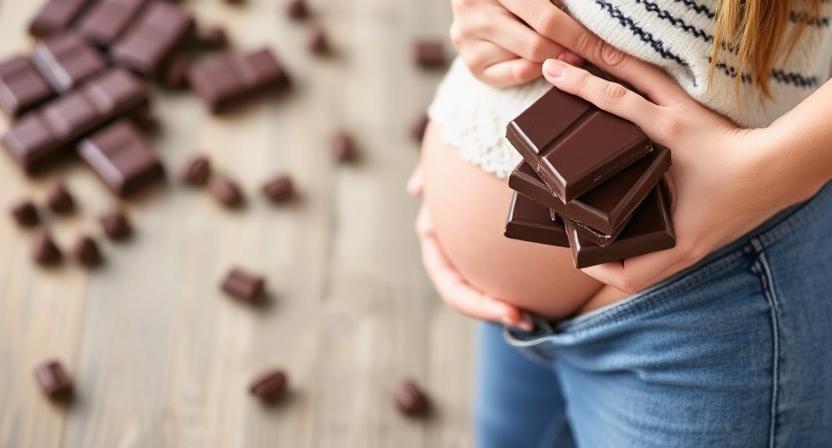Pregnancy is an exciting and transformative time, filled with various lifestyle changes, including dietary adjustments. One question that often arises is whether chocolate is a safe and healthy treat during pregnancy. Chocolate, especially dark chocolate, is a beloved indulgence for many, but expectant mothers might wonder if it’s okay to indulge in this sweet treat or if it’s best to avoid it altogether.
At Top Health Coach, we understand the importance of making informed choices for both the mother and baby during pregnancy. In this blog, we will explore the potential benefits and risks of chocolate consumption during pregnancy, and offer tips on how to incorporate it into a balanced diet.
The Benefits of Chocolate During Pregnancy
- Rich in Antioxidants
Dark chocolate, in particular, is a source of flavonoids, a type of antioxidant that can promote heart health and reduce inflammation. These antioxidants are beneficial for reducing the risk of preeclampsia, a condition that causes high blood pressure during pregnancy. A small piece of dark chocolate can provide an antioxidant boost without the need for excessive sugar or fat. - Mood Enhancer
Pregnancy can bring about a rollercoaster of emotions, and many women experience mood swings and stress during this time. Chocolate contains compounds such as theobromine and serotonin, which are known to elevate mood and promote feelings of happiness. A little chocolate can be a satisfying way to lift your spirits and help you relax. - Improved Blood Flow
The flavonoids in dark chocolate can also improve blood circulation by relaxing blood vessels and enhancing blood flow. This can contribute to better oxygen supply to both the mother and the growing baby. Healthy blood circulation is important for ensuring the proper development of the fetus. - May Help with Iron Deficiency
Iron is an essential nutrient during pregnancy to support the increased blood volume and to prevent anemia. While chocolate should not be relied upon as a primary source of iron, it can be a good occasional treat for women dealing with mild iron deficiency. Dark chocolate contains small amounts of iron, which may help supplement dietary intake. - Potential Reduction in Pregnancy Complications
Studies have suggested that moderate chocolate consumption during pregnancy, particularly dark chocolate, might reduce the risk of complications such as gestational hypertension. However, this benefit is primarily attributed to the flavonoids and antioxidants found in chocolate.
The Risks of Eating Chocolate During Pregnancy
While chocolate does have several potential benefits, it’s important to consider the risks of overconsumption during pregnancy. As with all foods, moderation is key.
- High Sugar Content
Many types of chocolate, especially milk chocolate, contain high levels of sugar, which can contribute to weight gain and increase the risk of gestational diabetes. Excessive sugar intake during pregnancy can lead to an increase in blood sugar levels, which can pose a threat to both the mother and the baby. Opting for dark chocolate with a higher cocoa percentage can help minimize sugar intake. - Caffeine Intake
Chocolate contains caffeine, though in smaller amounts than coffee or tea. While moderate caffeine consumption is generally considered safe during pregnancy, excessive intake can increase the risk of miscarriage, low birth weight, and preterm birth. It’s important to monitor your total caffeine intake from all sources, including chocolate, to ensure you’re staying within the recommended limits (200-300 mg per day). - Caloric Density
Chocolate is calorie-dense, and eating large amounts can lead to unnecessary weight gain. This can increase the risk of complications such as high blood pressure and gestational diabetes. It’s best to consume chocolate in moderation and keep track of your overall calorie intake during pregnancy. - Allergic Reactions
Some women may have a sensitivity or allergy to certain ingredients in chocolate, such as dairy or nuts. If you have any allergies, it’s important to check the ingredients and avoid chocolates that could trigger a reaction.
How to Incorporate Chocolate Into a Healthy Pregnancy Diet
- Choose Dark Chocolate
Opt for dark chocolate with at least 70% cocoa content. Dark chocolate is lower in sugar and has a higher concentration of antioxidants and nutrients than milk chocolate. This makes it a healthier option for satisfying your chocolate cravings. - Stick to Small Portions
A small piece of chocolate, around 1 ounce (28 grams), can provide a satisfying treat without overloading on calories, sugar, or caffeine. Moderation is key, so limit your intake to one or two small servings per day. - Combine Chocolate with Healthy Snacks
Pairing chocolate with other healthy foods can enhance its nutritional value. For example, you can enjoy a few pieces of dark chocolate with a handful of almonds or a serving of fresh fruit. This provides a balance of healthy fats, fiber, and vitamins. - Avoid Processed Chocolates
Many pre-packaged chocolates contain unhealthy additives, artificial sweeteners, or preservatives. To ensure you’re getting the healthiest option, choose organic or minimally processed dark chocolate. - Consult Your Healthcare Provider
If you have any concerns about eating chocolate during pregnancy, it’s always a good idea to consult your healthcare provider. They can provide personalized advice based on your individual health needs and pregnancy status.
8 FAQs About Chocolate and Pregnancy
1. Can I eat chocolate every day during pregnancy?
While it’s safe to enjoy chocolate in moderation, consuming it daily in large quantities is not recommended due to the high sugar and calorie content. A small amount of dark chocolate occasionally is fine.
2. Is milk chocolate safe during pregnancy?
Milk chocolate is generally safe to eat in moderation, but it contains more sugar and less beneficial cocoa than dark chocolate. Opt for dark chocolate if possible for a healthier option.
3. Can chocolate cause a miscarriage during pregnancy?
There is no direct evidence linking chocolate to an increased risk of miscarriage. However, excessive caffeine consumption, which can come from chocolate, should be avoided.
4. Can chocolate help with morning sickness?
Chocolate contains compounds that may help elevate your mood, but it won’t directly alleviate morning sickness. If you’re craving chocolate during morning sickness, try a small amount of dark chocolate.
5. Is it safe to eat chocolate with nuts while pregnant?
If you are not allergic to nuts, chocolate with nuts can be a healthy option, as nuts provide healthy fats and protein. Just be mindful of the added sugar content.
6. Can eating chocolate during pregnancy affect my baby’s development?
In moderation, chocolate is unlikely to harm your baby’s development. However, excessive intake of sugar and caffeine can have negative effects, so balance is important.
7. Is chocolate good for pregnant women with anemia?
Dark chocolate contains small amounts of iron, which may help support iron levels during pregnancy. However, it should not be relied on as the main source of iron.
8. Does chocolate improve blood circulation during pregnancy?
The flavonoids in dark chocolate may improve blood circulation, which could benefit both the mother and baby by supporting better oxygen and nutrient delivery to the fetus.
Conclusion
In conclusion, chocolate can be a delightful and beneficial treat during pregnancy when consumed in moderation. Dark chocolate, in particular, offers various health benefits, including antioxidants, mood enhancement, and potential protection against pregnancy complications. However, it’s crucial to avoid overindulgence, as excessive sugar and caffeine can pose risks. At Top Health Coach, we encourage expecting mothers to enjoy chocolate in a balanced, mindful way to support a healthy pregnancy.




